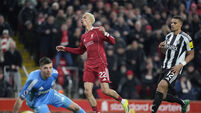Fans sick of ‘rip-off’ league
That is the view of the chairman of the Football Supporters' Federation, Malcolm Clarke, who feels falling attendances are a result of spiralling players' wages and continual movement of kick-off times in a league which has lost its competitive edge.
There were almost 62,000 spare seats across the nine Premiership matches at the weekend, which followed a significant drop in the crowds at the home midweek European ties involving Chelsea, Middlesbrough and Bolton.
Clarke believes it was only a matter of time before the "bubble burst" and fans started voicing their disapproval by staying away.
"We hate to tell you so," said Clarke.
"We told them at the time of the Football Task Force, and have been ever since, that a combination of price rises way above that of inflation, decreasing competitiveness and messing about with kick-off times would eventually result in the bubble bursting and there being a turn-off from fans.
"We are seeing the first signs of that happening. Supporters have had enough of being ripped off, the Premiership is boring, it is no longer competitive and there is a negative attitude to some of the players' wages.
"It is all a bit of a turn-off."
On Saturday, Charlton had introduced special measures including price reductions and allowing season-ticket holders to purchase additional seats which enabled them to be at capacity for their top-of-the-table clash with Chelsea at The Valley.
The game between old rivals Liverpool and Manchester United at Anfield sold out, but there were plenty of empty seats at Sunday's other Premier League matches almost 24,500 in total.
More than 8,000 of those were at the JJB Stadium in Wigan, a predominantly rugby league heartland.
Elsewhere, the City of Manchester Stadium was just over 5,000 under capacity for the north-west derby with Bolton, while Ewood Park was 10,642 short of a full house for the visit of Newcastle, which marked the final league appearance of Alan Shearer at his old stomping ground.
The increasing number of empty seats is a trend which is also beginning to worry managers, with Steve Bruce one to speak out following his side's draw at Portsmouth, where attendance was down almost 1,000 on capacity, with the Birmingham boss concerned the Premiership was losing its attraction.
Clarke declared: "Although Chelsea looked like they might have turned a two-horse race into a three-horse race last season, now it seems likely to be more of a one-horse race.
"Most supporters know before a ball is kicked their team stands little chance of winning the league and for a lot of them, there is no chance of winning anything at all, just the hope they will not slip into the relegation fight."
Clarke added: "The Taylor Report into the Hillsborough disaster said the introduction of all-seater stadia should not be accompanied by huge price rises, and a reasonable price to pay for watching top-flight football should be £6 (€8.90) in 1990.
"If you apply the inflation indicator, it comes out somewhere around £11 (€16.30), which is on a par with the Bundesliga and around Europe."
Some prices remain comparable with the top flight at grounds in the English Coca-Cola Football League, with Leeds charging as much as £45 (€67) for some seats and Gillingham in the third tier of English football setting their highest price at £37 (€55).
Despite these discrepancies, however, crowds in the lower English divisions are continuing to increase steadily each season.
Both of Sunday's Championship matches produced attendance figures of significantly more than 20,000.
Hull against Luton at the KC Stadium, which was broadcast live on Saturday at lunchtime, boasted a crowd of just above 19,000 putting them in touching distance of the attendance at both Fulham v West Ham (21,907) and Portsmouth v Birmingham (19,319), while topping Wigan's crowd of 16,641 against Middlesbrough on Sunday.
"It is a proper league, and there are around a dozen or so teams who could win the title or get into the play-offs competition which you just don't have in the Premiership," said Clarke.





